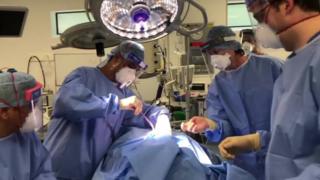 Image copyright Queen Victoria Hospital
Image copyright Queen Victoria HospitalThere could be a "tsunami" of cancelled operations this winter as the NHS copes with rising numbers of coronavirus patients, leading surgeons are warning.
Members of the Royal College of Surgeons of England say they doubt the NHS can meet targets to restore surgery back to near pre-pandemic levels.
Planned procedures such as hip replacements were paused to free up beds during lockdown in the spring.
And hospitals have since been dealing with a backlog.
In July, NHS England boss Sir Simon Stevens told trusts hospitals should by September 2020 be performing at least 80% of their September 2019 rates of:
- overnight planned procedures
- outpatient or day-case procedures
And by October, this proportion should rise to 90%.
But data suggests more than two million people have been waiting longer than 18 weeks for routine operations, with 83,000 waiting more than a year - up from 2,000 before the pandemic.
- TESTING: How do I get a virus test?
- SYMPTOMS: What are they and how to guard against them?
- LOOK-UP TOOL: How many cases in your area?
- YOUR QUESTIONS: We answer your queries
- THE R NUMBER: What it means and why it matters
- TREATMENT: How close are we to helping people?
More than 140,000 operations such as knee and hip replacements were performed in July 2020, up from 41,000 in April.
But that is less than half the level seen in July 2019.
The Royal College of Surgeons of England surveyed nearly 1,000 members in September and found:
- only 14% were now able to treat the same number of patients as before the pandemic
- 48% said planned operations were currently running at just 50-80% of 2019 levels
President of the college Prof Neil Mortensen said: "This is a national crisis requiring a truly national effort across all hospitals - private and NHS alike.
"As the virus becomes more prevalent again, there is a real risk of a tsunami of cancelled operations unless surgical beds are funded and protected.
"That means building up theatre capacity and designating beds exclusively for those who need an operation."
The poll also found:
- 22% were unable to access "Covid-light" hubs, which keep surgical patients separate from Covid-19 patients, particularly in Wales, Northern Ireland and north-east England
- 59% said their trust or health board was not routinely testing asymptomatic staff, to keep coronavirus off surgical wards
An NHS spokesman said the survey underestimated the amount of surgery now happening in the NHS, adding that goals for the end of August were met.
"The NHS has flexed its hospital capacity and community services as needed throughout the pandemic, treating over 110,000 severely ill people for Covid-19, and doubling the number of non-urgent operations since April. More people are set to benefit from the deal struck with independent hospitals also to make use of their bed capacity.
"Covid inpatient numbers are rising and much depends on keeping the virus under control through continued public action on hands-face-space, Test and Trace service, and rapid action to control local outbreaks," he said.
- LIVING WITH BULIMIA: Freddie Flintoff goes on a personal journey
- COVID-19: What can we expect the winter to look like?
from Via PakapNews